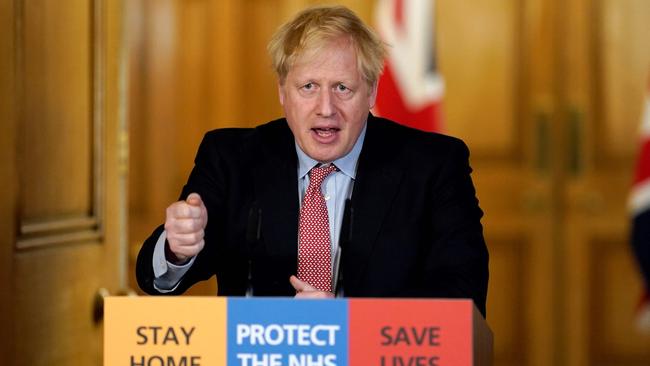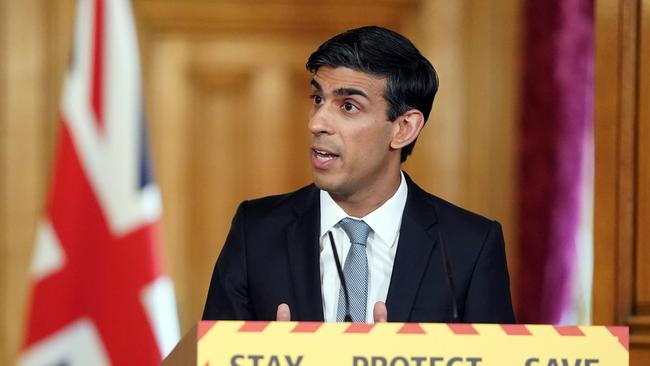Coronavirus: Boris Johnson v the Five Horsemen of the modern apocalypse
The British PM has the right personality, team and policies to guide the UK out of this disaster.

When Boris Johnson replaced Theresa May as Prime Minister and Tory leader last July, he inherited a complicated legacy. He knew from his two-thirds victory in the leadership election that he led a party deeply divided between Leavers and Remainers. He also knew from the Euro elections two months earlier that the broad conservative electorate was divided between the Tories (8 per cent in the popular vote) and Nigel Farage’s Brexit Party (30 per cent.) A difficult choice: should he try to unite the Tory party or the conservative electorate?
Acting on the maxim of Labour politician Denis Healey that “if you can’t ride two horses at once, you shouldn’t be in the bloody circus”, he decided to do both. He expelled 21 hardline Remain rebels, approved a strong manifesto commitment to Brexit, and rebutted media attempts to weaken it with escape clauses. On the other hand, he wasn’t about to lose Remain-voting Tory seats without a fight. So he also made clear there would be no general “de-selection” of Remainers, and invited penitent rebels to stay on board (which they almost all did).
This balancing act established his authority over the Tories. But any final choice still seemed up in the air. The crunch came in the general election campaign when the Tory and Brexit party managers discussed possible electoral pacts. Farage wanted a simple deal — we’ll stand down everywhere if you stand down in seats where the Brexit party came second to Labour. But the Tories never want another party to their right, however minuscule. They refused a deal and threatened to put the blame on Farage for the loss of Brexit unless he withdrew his candidates in Tory-held seats.
What would Farage get out of it? He’d get Brexit. And that, in the end, is what he got, plus 2 per cent of the national vote and no seats. Boris got a majority of 81.
Johnson’s new cabinet reflected this decision to prioritise Tory unity: there was a slight majority of Remainers but Leavers got the top three jobs — the Finance, Foreign, and Home departments. Long-term electoral trends, however, were pushing him to prioritise broad conservative unity. In the four elections before 2015 the Tory percentage of the national vote had hovered in the mid-30s. It stayed there in 2015 too, but that year Farage’s UK Independence Party took 12.6 per cent. Taken together, the two parties won 49.4 per cent that year, just over 45 per cent in 2017 and 49.2 per cent last year.
And in last year’s election this broad conservative electoral coalition expanded to take in northern working-class, blue-collar votes repelled by Labour’s drift to a middle-class progressivism. If the Tories hoped to keep them all in Johnson’s new “One Nation” coalition, it would have to do things they wanted; Brexit of course, but other things too.
In fact, the Johnson administration mainly dithered and disputed — replacing Sajid Javid with Rishi Sunak as Chancellor of the Exchequer, for instance — in the first few months of this year. Then the coronavirus pandemic struck, when it at once embarked on a bold policy of massive state spending to carry industry and citizens through the hard times of a mass epidemic and economic lockdown. Johnson’s popularity had already held up well during the fallow months. But these policies reflected what its new supporters wanted — which won’t always be the case — and its opinion poll ratings rose above 50 per cent.

It was at that point Johnson was rushed to Westminster hospital across the Thames. For reasons no one can quite explain, his plight struck a deep chord with all but the Boris haters, and his popularity rose still further. One poll, probably an outlier, showed Tory support at 61 per cent. Released from hospital and convalescing at Chequers, he will soon return to a political environment much more favourable to him than in July last year, that includes some hostile features, and that in particular presents him with three formidable problems to solve.
The improvements in his and the Tory position, though they would have been thought remarkable a year ago, are in danger of being taken for granted in the current crisis. To start with, he has made the Tories the party of the National Health Service, delivering an emotional speech in its praise after leaving hospital and making the phrase “Protect the NHS” the official slogan of the anti-epidemic campaign.
Mean-minded observers (like me) object that this gets things the wrong way around: the NHS is supposed to protect us, which it has a patchy record of doing. And this embrace of the NHS comes with the handicap that it will prevent the government attempting any NHS reform other than shovelling money at it. From a political standpoint, however, Johnson has stolen Labour’s most effective electoral card for his own hand, and most politicians would think that a better-than-decent bargain.
Second, his new cabinet redresses what has been seen as one of the Tory party’s weakest points: its lack of appeal to ethnic minority voters. His Foreign Secretary is the son of Czech immigrants; his Home Secretary is the daughter of Ugandan-Asian immigrants; and his first chancellor and the man who replaced him are both British-born children of immigrants from the Indian subcontinent. Indeed, according to opinion polls the latter, Sunak, is the most popular cabinet minister because of his bold spending measures and his authoritative presentation of them. These strengthen the “One Nation” credentials of the Johnson government in the liberal multiculturalist sense and (since all are Brexiteers) in the social cum patriotic one too.
Johnson’s third advantage is that the Labour Party is today as deeply divided as the Tories were a year ago. That’s being forgotten this week because the party’s new leader, Sir Keir Starmer, had an impressive debut at Prime Minister’s question time and has put together a unity shadow cabinet. Starmer, a former head of the Crown Prosecution Service, will undoubtedly run a more efficient opposition than the haplessly extreme Jeremy Corbyn. But the reality of Labour is a civil war between two sets of left-wingers: a middle-class progressive faction focused on cultural issues, and a demi-semi-revolutionary Marxist faction still loyal to Corbyn. Neither group has much hope of winning back the alienated northern blue-collar voters who are being wooed by the “People’s Boris”. Much of their energy will be devoted to fighting each other.
The main obstacle to Johnson is the political environment itself. This is divided between a democratic political system in which the Tory party is dominant and an interlocking system of cultural institutions (the media, universities, the quangos and so on) in which a left-liberal progressivism is dominant and increasingly aggressive.
Unless the Tories respond with their own more aggressive steps to reduce the cultural power of left-liberal progressives, then they will use that power to weaken and obstruct government policy. Fortunately for the Tories, their Boris derangement syndrome is so intense that they can’t help themselves from bursting out with it from time to time. After Johnson was released from hospital, the Europe editor of The Economist tweeted that there was something fishy about the whole drama of his illness. He deleted the tweet and apologised afterwards. But who will now read The Economist on Europe without remembering that clueless tweet?
This struggle between a revived democratic conservatism and an angry cultural progressivism may well be the defining fight of the Johnson years — akin to the miners’ battle against Thatcherism. For the moment, however, Boris has the political strength to change his mind on some earlier decisions that now look like mistakes. Much the most important is whether to cancel Huawei’s participation in building Britain’s 5G technology network. That was already opposed by Britain’s allies in the Five Eyes worldwide electronic “eavesdropping” system — a key element in Anglo-American-Australian security co-operation — and opposed by a strong minority of Tory backbenchers. Now that China has shown bad faith in its concealment of the COVID-19 outbreak, it’s all but impossible to justify participation in Britain’s most advanced communications network by a Chinese company with a legal obligation to obey China’s rulers on national security. Cancelling that decision should be a slam-dunk.
That’s not true of any of the three long-term problems facing the Johnson government. The first problem is when and how to exit the EU. Remainers are waging a last-ditch battle to extend the transition to full Brexit on the grounds that we shouldn’t add the problems of leaving to those of digging out of the post-pandemic recession. Because of the recession, however, Britain will inevitably be spending the next few years cultivating new export markets, rebuilding supply lines, creating a regulatory structure to match and seeking new trade deals in any event. All these tasks will be easier if Britain doesn’t need the advance consent of Brussels to them. Leaving the EU without a free-trade deal may therefore be less risky than trying to negotiate one while effectively inside the EU. And if Britain stays on, the country would have to pay some of the costs of cleaning up the looming Euro crisis. Johnson’s chief negotiator, David Frost, seems to have accepted this logic and announced Britain will leave the EU at the end of the year “with or without a deal”. And that had probably settled the matter in a way that finally satisfies his party and most voters. Polls show a clear majority now believes Brexit was the right decision.
Handling the pandemic, his second problem, is a matter of choosing a policy that minimises the total number of deaths by balancing between suppressing the virus and preventing economic breakdown, as we learn more about which tactic is likely to save more lives at which point in the pandemic. Neither choice can possibly be popular, especially when the experts are uncertain on key issues and the media is desperate to catch out ministers in errors or worse. But Johnson has armoured himself against these attacks with his embrace of the NHS. Besides, as de Gaulle said, “to govern is to choose”.
That leaves how Johnson should plan to exit the post-virus recession. So how did different nations tackle their ruined economies after 1945? Britain adopted a mix of state control, nationalisation, extensive regulation and currency depreciation. Germany and Italy chose deregulation and monetary control of inflation. Economically, the result was that the UK grew out of recession more slowly than either country. Italy’s GDP was back to pre-war levels by 1949. The German miracle was famous. Britain was still rationing in the early 1950s.
Johnson was never a fan of the deregulated Brexit known as Singapore-on-the-Thames. But he never planned for the pandemic either. Now he has to deal with its economic consequences and, contrary to conventional wisdom, these require a more flexible, deregulated and low-tax economy than the infrastructure-fuelled-by-borrowing expansionism he was cherishing two months ago.
Nor would such a policy let down the new Tory voters in the north. For most of the 20th century the Tories got fully half their total vote from the working class on a policy that combined social-welfare provision with free-enterprise prosperity — in today’s terms, the NHS plus job creation through deregulation and inward investment. Sure, he would have to sell these policies against a hostile cultural establishment. But Johnson has shown he can ride two horses, and do so with style. The question now is: Can he ride five?
John O’Sullivan is a British commentator and journalist. He was a senior policy adviser and speechwriter for prime minister Margaret Thatcher and editor of Quadrant magazine from 2015 to 2017.



To join the conversation, please log in. Don't have an account? Register
Join the conversation, you are commenting as Logout